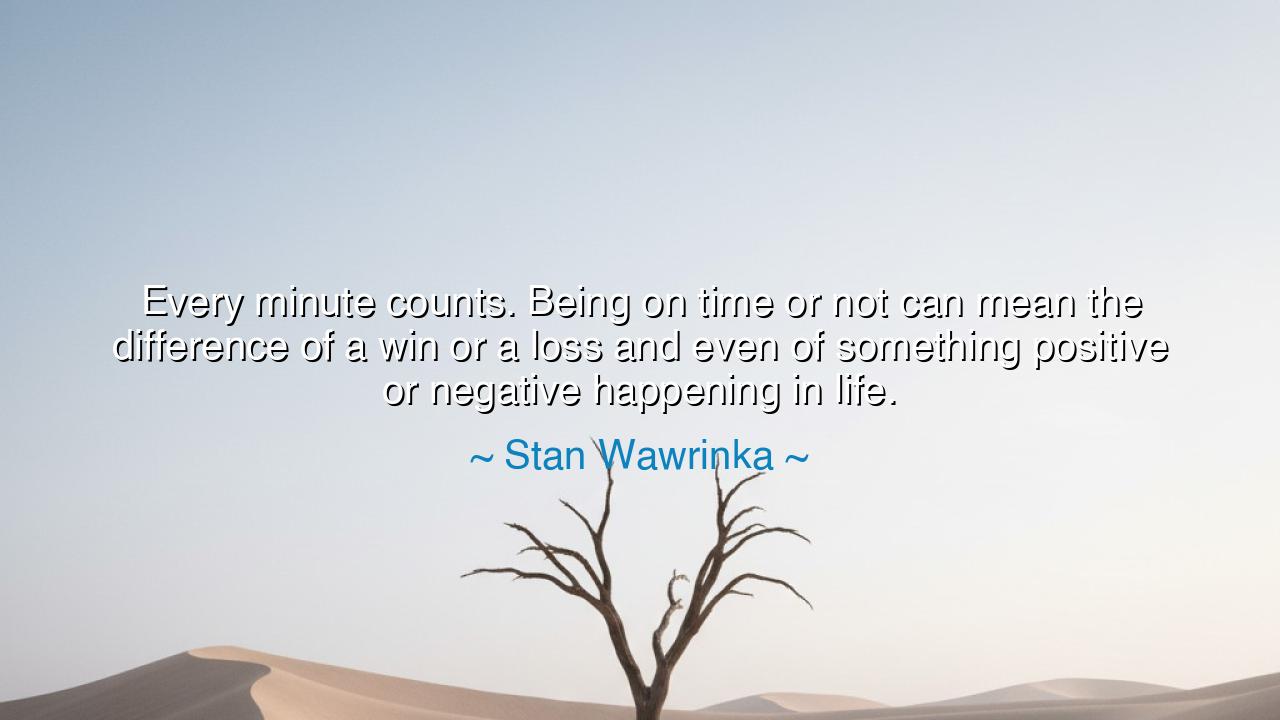
Every minute counts. Being on time or not can mean the
Every minute counts. Being on time or not can mean the difference of a win or a loss and even of something positive or negative happening in life.






Hear the words of Stan Wawrinka, a warrior of the court, who declared: “Every minute counts. Being on time or not can mean the difference of a win or a loss and even of something positive or negative happening in life.” These words ring like the sound of a temple bell, reminding us that time is not a river to be wasted, but a sacred current upon which destiny itself sails. To squander it is to drift into chaos; to honor it is to command the winds of fortune.
In the world of sport, the measure of a heartbeat can decide the outcome of a match. A late step, a moment’s hesitation, a single second lost—these can shatter victory. But Wawrinka speaks not only of tennis, nor of games. He speaks of the greater field of life, where being on time is often the key that opens the door to fate. To arrive late may be to miss the chance that never comes again, but to arrive in season is to align oneself with the rhythm of opportunity.
Think of the tale of Napoleon at Waterloo. It was said that the late arrival of Marshal Grouchy’s troops, delayed by hours, allowed the forces of Prussia to join Wellington’s army. That delay, those minutes lost, sealed the fate of an emperor and reshaped the map of Europe. Here is proof eternal: every minute counts, and history itself bends on the hinge of punctuality.
So too in the quieter realms of daily life. A physician who arrives too late to tend the sick may witness death instead of healing. A traveler who lingers but a moment too long may miss the vessel that would carry him to safety or fortune. Yet the one who honors the moment, who rises with discipline and walks in step with time, becomes like an archer whose arrow strikes its mark.
What is the meaning, then, of Wawrinka’s words? They remind us that time is a teacher, a ruler, and a judge. It favors no one, yet it rewards the vigilant. To be careless with minutes is to invite defeat; to treat them as jewels is to live with mastery. The soul that understands this will cultivate readiness—not tomorrow, not later, but now.
The lesson for the seeker is clear: respect the minute, for it is the seed of the hour, and the hour shapes the destiny of a life. Begin by rising when you should rise, by speaking when the moment calls, by acting without delay when virtue demands it. Train yourself as the athlete trains, sharpening not only the body but also the will to move in harmony with the call of the present.
Practical wisdom calls us to three actions: keep watch over your time as a shepherd over his flock, for once lost it cannot be gathered again; practice punctuality, for it is a form of respect both for yourself and for others; and above all, do not wait for the perfect moment, for the moment you have is already perfect if you choose to act. In these small disciplines lies the difference between victory and defeat, between a life wasted and a life fulfilled.
So let it be said: every minute counts. The wise will seize it as a gift, the foolish will let it slip as sand through idle hands. Choose, then, to honor time, and time will honor you, crowning your days with purpose, and your life with the dignity of one who lived not in delay, but in readiness.






TBTran Binh
Reading this makes me think about the psychological impact of time awareness. Does internalizing the importance of every minute encourage proactivity and preparedness, or can it foster anxiety when outcomes are unpredictable? How can athletes, students, and professionals strike a balance between valuing time and maintaining composure? Examining this could illuminate strategies for using time-consciousness to enhance performance without becoming paralyzed by the pressure of constant precision.
DNTran Duc Nhan
I find this viewpoint compelling, but it also raises questions about perspective and relativity. How do we determine which moments are truly critical and which allow for some leeway? Does viewing every minute as potentially life-changing risk overestimating the importance of minor delays, or does it help cultivate a habit of attentiveness and responsibility? Considering these angles could deepen our understanding of how discipline and timing influence outcomes in diverse contexts.
NDHa Ngoc Diep
This statement sparks curiosity about the balance between precision and flexibility. In sports, every second might count, but in other aspects of life, is there room for spontaneity or errors? Could an obsession with punctuality limit creativity or adaptability? Understanding how the principle of ‘every minute counts’ applies differently in high-stakes versus everyday contexts could provide insight into its practical and psychological effects.
TTNguyen thi Thuy
Stan Wawrinka’s perspective makes me reflect on the broader implications of punctuality. Beyond sports, how does being on time influence opportunities, relationships, or career success? I also wonder whether the emphasis on every minute creates pressure or stress in daily life, or if it cultivates discipline and focus. Exploring this could reveal how time management shapes outcomes and mindset, both in competitive environments and in ordinary life situations.